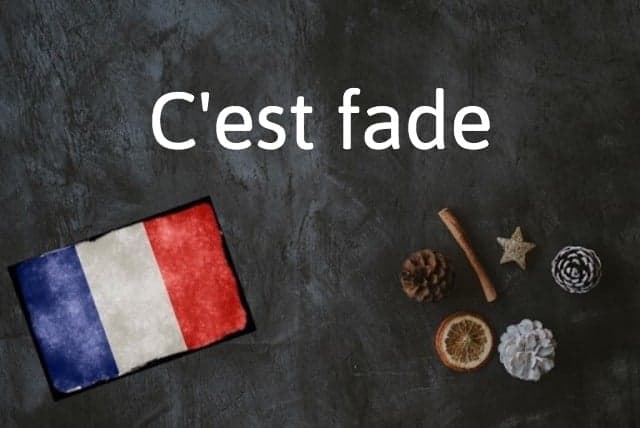French expression of the day: C'est fade

How to critique food in France like a pro.
Why do I need to know c'est fade?
Because it will elevate your food critiquing abilities to Top Chef France levels.
Plus, it will be of use if you're one of the unlucky coronavirus victims who has lost their sense of taste and smell.
What does it mean?
Fade is a French expression people use to say that something is 'tasteless', 'bland', 'boring'.
C'est fade, ça manque de saveur. - 'It's bland, it lacks flavour.'
It’s commonly used for food, and if you’ve watched Top Chef France, you might have heard something like:
Je trouve ce plat très fade, il n’y a ni de goût ni de couleurs ! - ‘I find this dish very bland, there’s no taste or colour!’
In a country like France where "food" means a million more things than just "fuel", a chef does not want his or her food to be defined as fade.
Like this Twitter user did with a Parisian pizzeria:
"A ruined attempt on a Neapolitan pizza: dough too thin, crust not high enough, bland tomato sauce and, average cheese. Pity."
Pizza napolitaine ratée: pate trop fine, croite pas assez levé, sauce tomate fade, fromage quelconque. Dommage. (@ Don Pépé in Boulogne-Billancourt) https://t.co/eg6Nb9HhW0 pic.twitter.com/Z74fUprSH0
— Ben Hanau (@bhanau) April 19, 2018
While fade is above all a food expression, you can use it in other settings too.
Il est fade, ce tableau. Il ne me transcend pas du tout. - 'What a bland painting. It doesn't appeal to me at all'.
Je trouve ton pull trop fade. - 'I find your sweater so dull.'
Synonyms
Insipide - tasteless
Inintéressant - uninteresting
Ennuyeux - boring
Comments (1)
See Also
Why do I need to know c'est fade?
Because it will elevate your food critiquing abilities to Top Chef France levels.
Plus, it will be of use if you're one of the unlucky coronavirus victims who has lost their sense of taste and smell.
What does it mean?
Fade is a French expression people use to say that something is 'tasteless', 'bland', 'boring'.
C'est fade, ça manque de saveur. - 'It's bland, it lacks flavour.'
It’s commonly used for food, and if you’ve watched Top Chef France, you might have heard something like:
Je trouve ce plat très fade, il n’y a ni de goût ni de couleurs ! - ‘I find this dish very bland, there’s no taste or colour!’
Like this Twitter user did with a Parisian pizzeria:
"A ruined attempt on a Neapolitan pizza: dough too thin, crust not high enough, bland tomato sauce and, average cheese. Pity."
Pizza napolitaine ratée: pate trop fine, croite pas assez levé, sauce tomate fade, fromage quelconque. Dommage. (@ Don Pépé in Boulogne-Billancourt) https://t.co/eg6Nb9HhW0 pic.twitter.com/Z74fUprSH0
— Ben Hanau (@bhanau) April 19, 2018
Join the conversation in our comments section below. Share your own views and experience and if you have a question or suggestion for our journalists then email us at [email protected].
Please keep comments civil, constructive and on topic – and make sure to read our terms of use before getting involved.
Please log in here to leave a comment.